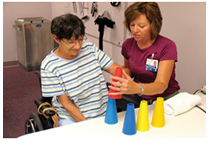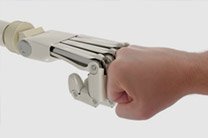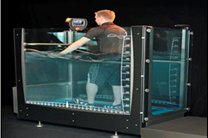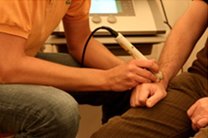- Stroke
- Orthopaedic fractures and other injuries
- Head and Spinal cord injury
- Parkinson’s disease
- Multiple Sclerosis (MS)
- Muscular Dystrophy
- Cerebral Palsy (CP)
- Guillain-Barré syndrome (GBS)
- Fibromyalgia
- Laminectomy
Home Occupational Therapy
 Occupational therapists work from an understanding that there is a relationship between the things that people do and their health and well-being. Life-altering conditions such as a stroke, spinal cord injury, or loss of a limb can significantly impact a person's ability to perform simple daily tasks like dressing, bathing, preparing a meal or attending a workplace. Occupational therapists work with individuals to devise a comprehensive treatment program that will enable them to regain their independence in daily tasks, successfully manage their home and office, and participate fully in leisure and community activities.
Occupational therapists work from an understanding that there is a relationship between the things that people do and their health and well-being. Life-altering conditions such as a stroke, spinal cord injury, or loss of a limb can significantly impact a person's ability to perform simple daily tasks like dressing, bathing, preparing a meal or attending a workplace. Occupational therapists work with individuals to devise a comprehensive treatment program that will enable them to regain their independence in daily tasks, successfully manage their home and office, and participate fully in leisure and community activities.
At WellnessOne, we offer a number of specialized services to help individuals to improve their quality of life at home and in the community. Our highly skilled staffs uses trained observation and standardized testing to evaluate how the patient’s condition is affecting their ability to perform a variety of daily functions. This evaluation, along with the expressed goals of the patient and his or her caregiver, is then used to identify areas that need improvement.
In addition, the therapist will develop specific problem-solving strategies to help ensure the patient’s independence in day-to-day activities. Depending on the patient’s needs, these may include modifying the patient’s environment, training the patient in the use of assistive devices and equipment such as orthotics (splints) to improve functional performance and helping the patient manage his or her energy. Attention is also given to improving and restoring sensory-motor and neuromuscular functioning as well as visual and cognitive-perceptual components of performance.
Who can benefit from occupational therapy?
Neurological conditions
- Motor Neurone disease (MND)
- Chronic Fatigue syndrome
- Arthritis
- Ankylosing spondylitis (AS)
- Low back, thoracic or neck pain
- Chronic low back / neck pain
- Sciatica
- Whiplash
- Disc herniation
Learning difficulties
- Development delay
- Dyspraxia












